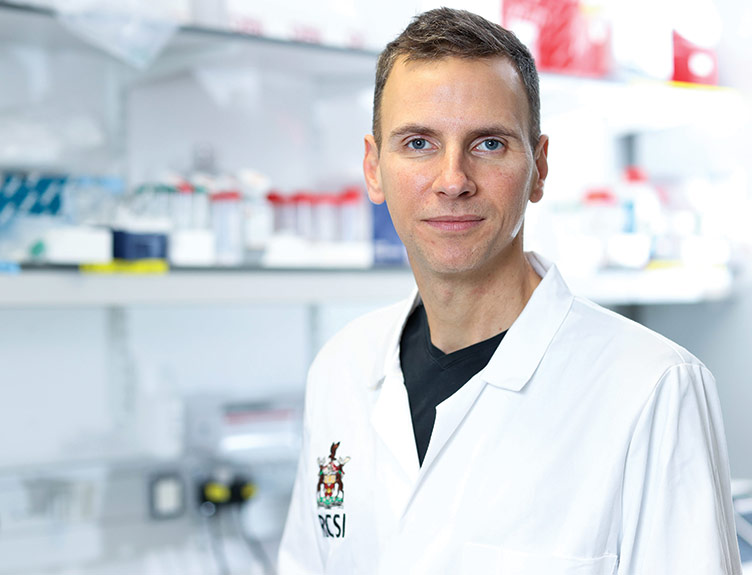World-leading diabetes expert to speak about the impact of sleep on metabolism at 3U Diabetes Conference

The impact of sleep disturbance and disruption of the normal circadian rhythm is a major focus of the Sixth Annual 3U Partnership International Diabetes Conference entitled ‘Current Challenges in Diabetes Research' which takes place at RCSI in Dublin today.
The conference was opened by Professor Seamus Sreenan, Director of the Graduate Entry Programme in Medicine, RCSI and Consultant in Diabetes and Endocrinology, Connolly Hospital.
The impact of sleep quality on metabolism will be discussed by Professor Eve Van Cauter, Frederick H. Rawson Professor Section of Endocrinology, Diabetes and Metabolism at the University of Chicago. During the past decade, Professor Van Cauter's research has focused on the impact of reduced sleep duration and sleep quality on metabolic health and has explored the link between sleep disturbances and obesity. Seminal studies from her research group identified reductions in sleep quantity and quality as novel risk factors for obesity and diabetes. More recently, Professor Van Cauter has focused on understanding the mechanisms underlying the impact of poor quality sleep and metabolic disturbances discovering important links between insufficient sleep and dysregulation of hunger and appetite.
Professor Van Cauter's talk will be complimented by a presentation by Dr Andrew Coogan, a member of the 3U group, Director of the Chronobiology and Sleep Research Laboratory at Maynooth University. Working with colleagues at Connolly Hospital in Dublin, Dr Coogan has explored the impact of disruption of circadian rhythms on metabolic control of diabetes.
Dr Donal O'Gorman, of the School of Health and Human Performance at Dublin City University (DCU) and Director of the 3U Diabetes Consortium, commented: "The central role of sleep in the maintenance of general and metabolic health has emerged over the last two decades and we are very excited to focus on this area at our annual meeting this year and to have the leading expert in the field to address the conference. This area has been one of the interests of the consortium over the last number of years. Disturbances of sleep and normal biological rhythms are something that society has grown to accept over recent years and the reasons for them are multi-factorial and complex.
"We believe that not only are sleep and circadian rhythm disruption important risk factors for diabetes but also that they impact on control of the condition and should be considered as part of regular assessments of diabetes control in individual patients. We will use the conference this year to discuss the latest research in the area and hope to draw attention to the importance of sleep and circadian rhythms to metabolic health," Dr O'Gorman concluded.
Researchers from the US, Sweden, the UK and Switzerland will join the local faculty for the conference which will also cover additional ‘hot topics' in research into both type-1 and type-2 diabetes. Other talks will focus on attempts to prevent the development and progression of type-1 diabetes and the roles of adipose tissue and beta cell dysfunction in type-2 diabetes. The meeting will be opened by Dr Angus Jones from the University of Exeter who will propose a novel approach to determining the most appropriate management for people with diabetes based on optimising the use of clinical data to correctly categorise the type of diabetes in the individual.
The 3U Diabetes Consortium, comprising clinicians and scientists from RCSI, DCU and Maynooth University, is committed to developing cutting edge research into this chronic and costly disease in Ireland and aligns a number of interlinked areas of research into the condition extending from identifying and developing new molecules with therapeutic potential to providing world class diabetes care and treatments in the clinic.
Dr O'Gorman, commented that ‘we are again delighted to welcome such an outstanding group of researchers to RCSI for this year's conference. The faculty, which includes the winner of the Rising Star award from the 2016 European Association for the Study of Diabetes, comprises clinical and basic science researchers from North America and Europe who will share their current research findings with us and discuss the challenges of managing type-1 and type-2 diabetes. With diabetes being one of the commonest chronic diseases in Ireland, maintaining the focus on the condition and supporting research into the condition is of paramount importance in helping improve patients' lives.'



